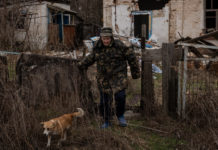MANILA — Millions of Filipinos voted Monday to choose half of the nation’s Senate in what was widely seen as a proxy battle between President Rodrigo Duterte and politicians opposed to his deadly war on drugs.
Throughout the day, the police reported scattered incidents of violence and voter intimidation, including a shooting that injured five people at one voting area, as well as bombings believed to be connected to the elections.
Nearly 300,000 police officers and members of the armed forces were deployed nationwide to prevent violence, with the national police reporting that at least 20 people had been killed and 24 injured in election-related attacks in the weeks leading up to the voting.
Up for grabs are 12 Senate seats, nearly 300 seats in the House of Representatives, and thousands of local posts, including mayor and governor positions, according to the Commission on Elections. But the spotlight was on the race for the Senate, where a tiny minority has been successful in blocking Mr. Duterte’s legislative agenda. Results are expected to be released in a few days.
Mr. Duterte voted in his hometown, Davao City, on Monday afternoon. He spent the last few days campaigning for Senate candidates supportive of his agenda, vowing to push forward with an antidrug crackdown that has left thousands dead.
After casting his ballot, Mr. Duterte was asked by reporters if the election was a referendum on his administration.
“It could be,” he said. “It could be taken as a referendum, so that if you agree with me, then you can vote for my candidates or the people I am supporting this election.”
In the days before the vote, he took aim at what he characterized as a political elite that wants him out because he is an outsider, and he rebuffed criticism of his antidrug crackdown.
“I’m not the one who gives orders,” he said on Friday in countering accusations that he is the force behind the extrajudicial killings of drug suspects. “I would just tell you to arrest them and if they don’t surrender, kill them. But arrest them all and destroy the organization of drugs.”
Analysts say Mr. Duterte did not pull any punches for Monday’s elections, and wants to fill the 12 seats up for grabs in the 24-member Senate with allies who will not hinder his legislative agenda. Chief among his goals is revising the country’s Constitution to effectively lift term limits. He is also backing legislation to lower the age of criminal liability of child offenders as well as bring back the death penalty for some serious crimes.
The Senate is seen as one of the last bulwarks against his increasingly authoritarian rule, but with the opposition struggling, his foes fear that Monday’s voting will help him consolidate his power and push through his agenda.
Ramon Casiple, head of the Institute for Political and Electoral Reform, said a victory by Mr. Duterte’s allies on Monday “would spell a continuity of his political agenda and strengthening of his hold on power.”
He said the candidacies of key Duterte allies, including his one-time personal aide, Bong Go, and Ronald dela Rosa, the police chief, could be propelled by Mr. Duterte’s popularity, noting that various surveys have said that a majority of the country’s population still backed the president and turned a blind eye on the excesses of his drugs crackdown.
“That Duterte continues to enjoy an unprecedented 80 percent popularity after three years speaks of his understanding of the reality on the ground, specifically of the yearning of the vast sections of the poor,” Mr. Casiple said.
Monday’s elections are taking place at the midpoint of Mr. Duterte’s six-year term. And unlike the House of Representatives, which has supported Mr. Duterte’s war on drugs and other policies, the Senate has been seen as more independent. Six members of the opposition are in the minority bloc, while the rest are allied with the president.
The opposition has already been weakened, with one member, Senator Leila de Lima, in jail for what she says are trumped-up charges, and another critic, Antonio Trillanes, not seeking re-election.
Meanwhile, the nation’s police chief, Oscar Albayalde, cited widespread reports of cheating.
“We are seeing a massive increase in vote buying,” he said, adding that since voting began Monday, more than 230 people had been arrested.
In the far-flung southern island of Jolo, five people were wounded in a shooting Monday outside a polling area, while three explosions were recorded since Sunday night elsewhere in the troubled Mindanao region, which remains under military control after Islamic State-linked Filipino militants led a siege of the city of Marawi. Explosions also hit two town halls in the southern province of Maguindanao, where warlords have traditionally vied for control.
Source : Nytimes










-218x150.jpg)



